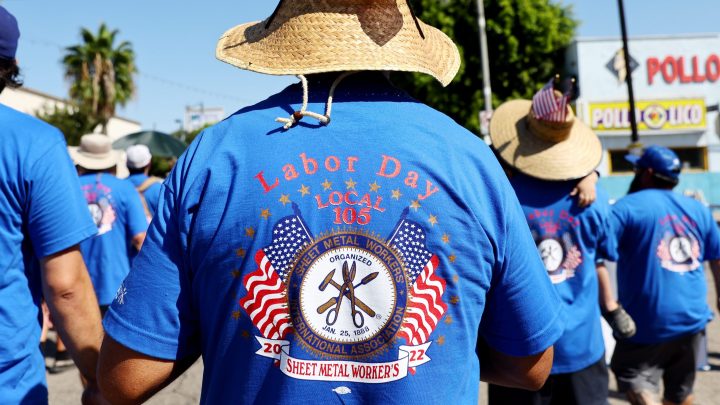
How Labor Day has changed — and not changed — in its 140-year history
How Labor Day has changed — and not changed — in its 140-year history

In September 1882, labor leaders, workers and supporters gathered in New York City for the world’s first Labor Day parade.
According to Allyson Brantley, an associate professor of history at the University of La Verne in California, local activists organized a festival to amplify the presence of labor in the city and kick off an annual convention of the Knights of Labor, a workers rights organization.
In the 140 years since that first Labor Day festival, Brantley said, the holiday has changed — and not changed — a lot.
The late 1800s were an important time for labor activism in the United States. Industrialization had led to an expansion of wealth at the top, while more workers were laboring in cities and factories than ever before.
“In those workplaces, immigrants and working-class folks increasingly [turned] to labor unions to build power,” Brantley said. That led to sometimes bloody conflicts between workers and employers. “Labor Day parades and festivals and picnics become a key moment every year to come together and honor that struggle and also look forward to another year of momentum and power building.”
Donna Haverty-Stacke, a professor of history at Hunter College in New York, has written that early Labor Day celebrations highlighted “ideological and tactical divisions” within the labor movement, as union leaders sought to balance the leisure activities that became associated with the holiday with displays of union solidarity and strength. Parades — as both a leisure activity and a display of solidarity — were encouraged by union organizers.
By the 1890s, two dozen states had adopted Labor Day as a holiday.
Some historians believe that the Pullman railroad strike, which disrupted rail traffic and commerce in 27 states, played a role in President Grover Cleveland’s decision to designate “Labor’s Holiday” a federal holiday in 1894.
“At the same time as he’s cracking down on strikers and trying to get this railway strike to end and for commerce to move forward, he designates Labor Day a national holiday,” Brantley explained. “I think that it could be seen as kind of this pandering gesture or a concession to labor.”
In the decades that followed, Labor Day parades continued. “But I think it ends up being kind of sanitized or loses a little bit of the exuberance in the context of the Cold War after World War II,” Brantley said. Because unions were under pressure during the Cold War to distance themselves from communist culture, she said Labor Day celebrations became less radical and more institutionalized.
As one example, she said that starting in 1947, Labor Day in Los Angeles was marked by a Catholic Mass and fancy breakfast. “That ends up being the way that Labor Day is kind of repackaged for the era of the Cold War,” she said.
Today, though the tradition of Labor Day parades lives on, Brantley said they’re no longer the main event of the day as they were around the turn of the 20th century.
“I think Labor Day today has become much more focused around the end of summer as, like, a last hurrah of holiday,” she said.
Today, much like the 1880s, there is a lot of visible evidence of labor activism. The WGA and SAG-AFTRA are still striking against Hollywood producers, the Teamsters and UPS narrowly averted a strike last month and hospitality workers have rallied on the streets of Las Vegas amid ongoing contract negotiations.
“I think maybe a key lesson to be drawn from Labor Day of the past, or Labor Day of old, is that there’s a lot of power in community support,” said Brantley. “And, yes, it’s great to support a strike online. But also, you know, maybe there’s something to be said for a big parade that demonstrates large-scale, broad solidarity.”
There’s a lot happening in the world. Through it all, Marketplace is here for you.
You rely on Marketplace to break down the world’s events and tell you how it affects you in a fact-based, approachable way. We rely on your financial support to keep making that possible.
Your donation today powers the independent journalism that you rely on. For just $5/month, you can help sustain Marketplace so we can keep reporting on the things that matter to you.

















